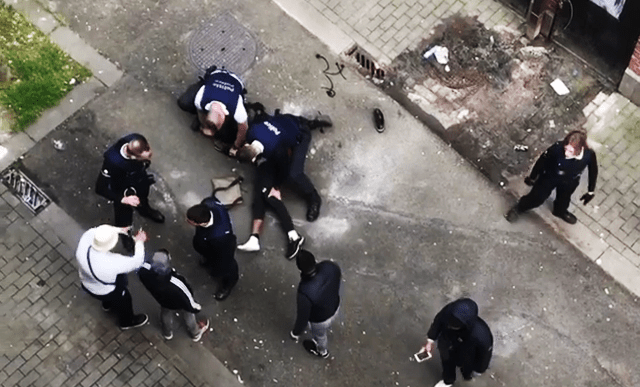Ethnic minorities in Belgium were disproportionately targetted by police checks and excessive use of force throughout the coronavirus lockdown, according to a newly published report.
Released Wednesday by Amnesty International (AI), the report concluded that lockdowns had uncovered a "disturbing pattern" of racial bias and discrimination within police forces in Belgium and 11 other European countries.
"Police enforcing Covid-19 lockdowns across Europe have disproportionately targeted ethnic minority and marginalised groups with violence, discriminatory identity checks, forced quarantines and fines," the report found.
Related News
- Belgian police calls for 'mutual respect' in open letter
- Belgian police called out for use of excessive force during lockdown
- Looting: 23 people arrested in Brussels
Since the lockdown was enforced on 17 March, police in Belgium recorded some 100,000 instances in which regulations were breached.
Out of 102 reports and allegations of abusive police behaviour collected by the non-profit Human Rights League, Amnesty International (AI) found that 36% were instances of unlawful use of force by police and 21% concerned cases where police uttered insults.
In 40% of those cases, the victims were racial or ethnic minorities living in working-class neighbourhoods of Brussels, AI researchers concluded.
Disproportionate use of force
Referring to the case of Adil, a 19-year-old who died as three police cars chased after him, AI researchers questioned whether deploying "several police cars to chase a man who apparently did not constitute a threat to anyone's physical integrity and had not committed a serious offence" was a proportionate response by police.
In another incident, researchers said one police officer was on trial for the arbitrary arrest of a Sudanese national, whom they reported was beat up during a check.
"According to the man’s lawyer, police hit him several times while carrying out an identity check. Then, they arbitrarily detained him and forced him into their van before releasing him shortly after," researchers wrote.
AI said that video footage they reviewed of the incident showed the man moments after his arrest lying on the pavement after police released him.
"On the video, the man is weeping and his phone and belongings are scattered around him. According to his lawyer, one police officer sprayed tear gas in his face after releasing him on the street where the video was shot."
Restriction of civil liberties
The global advocacy group also cited several cases of arbitrary detentions or excessive use of force, as well as reports of "arbitrary restrictions" to the right to freedom of expression.
AI referred to at least 10 cases in which police ordered the removal of banners calling for "Justice for Adil" from the windows or façades of their homes.
In another instance, AI said police unduly arrested and strip-searched a man, identified as Chahr, for kayaking in a public park in Brussels while carrying a banner calling for the regularisation of undocumented migrants.
The man's display came after lockdown restrictions had been lifted which included news that kayaking was allowed again.
"Police handcuffed him, tackled him to the ground where he was held face down while a police officer pushed his knee into Chahr’s back. Police took Chahr to the police station where they strip-searched him and kept him in pre-charge detention before releasing him without charge," the researchers wrote.
AI's findings in Belgium coincide with past reports which had found evidence that police checks in Belgium disproportionally targetted black people and people of North African origin over whites.
“Police violence and concerns about institutional racism are not new, but the COVID-19 pandemic and coercive enforcement of the resulting lockdowns have exposed just how prevalent they are,” the report found.
Gabriela Galindo
The Brussels Times

